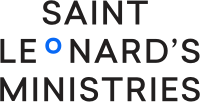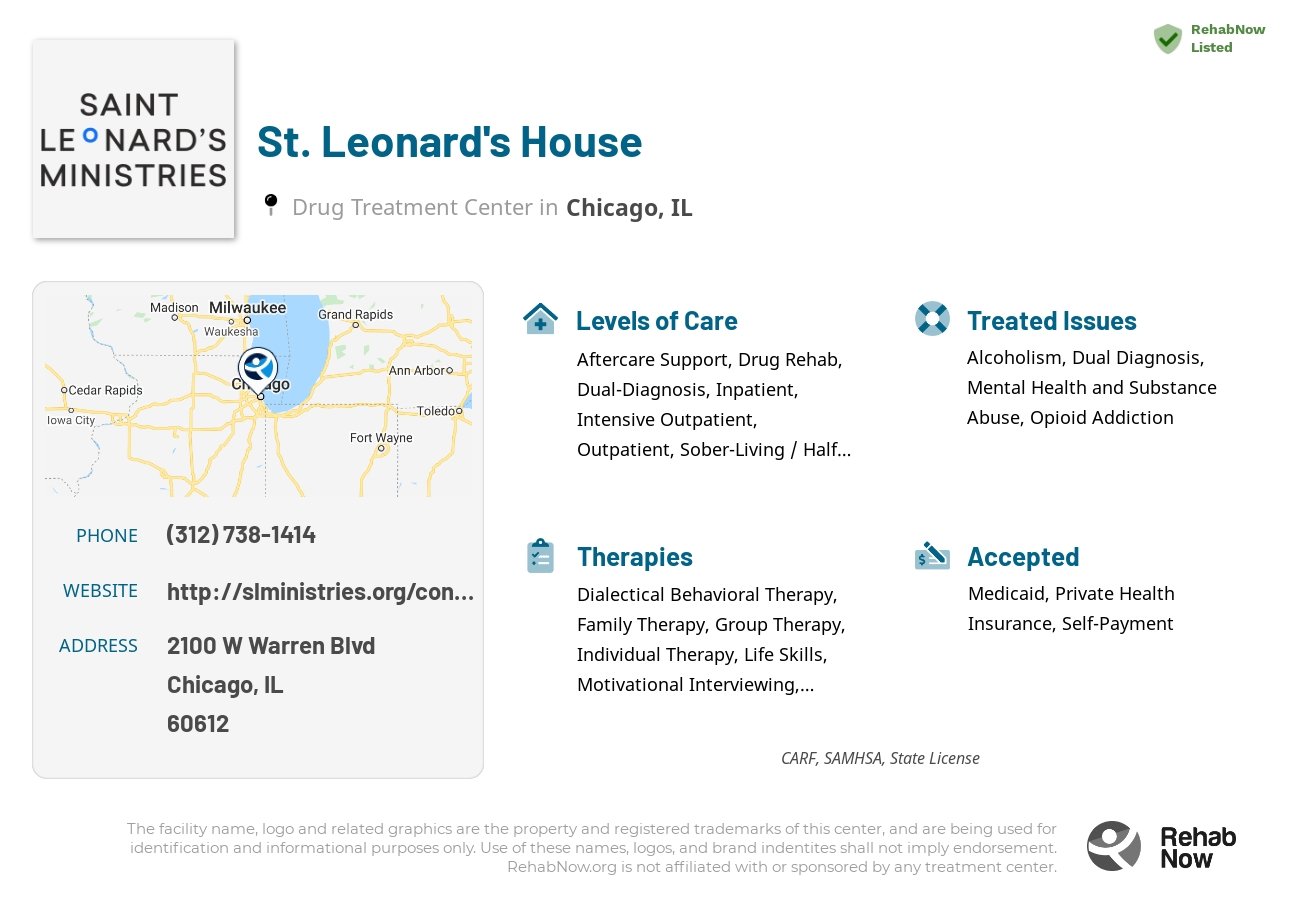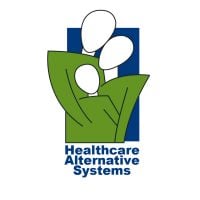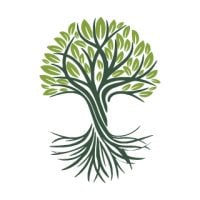St. Leonard's House
Drug Rehab Center in Chicago, Illinois
St. Leonard's House is an accredited and state-licensed addiction treatment center in Chicago, IL that offers a comprehensive range of care for individuals struggling with alcohol or drug use, dual diagnosis, and other mental health issues, with a focus on building the foundations for long-term sobriety and providing aftercare support.
About This Illinois Facility
Located in Chicago, Illinois, St. Leonard's House provides a unique transitional housing program for adult men recovering from incarceration. With a focus on 12-Step residential programming and aftercare, this 40-bed facility stands out for its specialized services catering to diverse demographics and its comprehensive care that includes medical assessments, personalized planning, and various therapeutic modalities.
St. Leonard’s House is distinguished not only by its state license and CARF accreditation but also by its commitment to supporting clients through every step of their recovery journey. Financial assistance options, including Medicaid and sliding-scale payments, ensure access to their broad array of services from inpatient care to outpatient support and aftercare planning.
- Specialized services cater to young adults, bilingual clients, and those with HIV/AIDS or hearing impairments, emphasizing inclusivity.
- Various therapeutic approaches include CBT, DBT, and motivational interviewing, tailored to support individual recovery paths.
- Choice amenities such as private rooms and a gym offer a comfortable environment conducive to recovery and personal growth.
At St. Leonard’s House, adult men struggling with alcoholism, opioid addiction, drug addiction, and co-occurring mental health issues find tailored treatment. The program’s intensive counseling, life skills training, and aftercare services are designed to foster sustained sobriety and successful reintegration into the community.
Genders
Ages
Modality
Additional
Accreditations
State License
SAMHSA

CARF
The Commission on Accreditation of Rehabilitation Facilities (CARF) is a non-profit organization that specifically accredits rehab organizations. Founded in 1966, CARF's, mission is to help service providers like rehab facilities maintain high standards of care.
Conditions and Issues Treated
With so many people struggling with opioid addiction, opioid addiction treatment is more critical than ever before. Patients often take opioids when they face a painful injury. When someone begins taking opioids such as Vicodin or oxycodone differently than how the medications were prescribed, this points to opioid addiction.
Stopping these types of medications abruptly is not safe. That is where opioid addiction treatment at St. Leonard's House in Chicago, IL comes in. Most opioid addiction treatment facilities start with detox and move to rehabilitation services while providing medical support during the process.
Getting over an opioid addiction takes time and determination, but with the right support and resources, those struggling with opioid addiction can recover and move forward with their lives.
An underlying cause often brings about addiction. Mental disorders can lie at the center, such as schizophrenia, bipolar disorder or anxiety disorder. As well as the cause of the addiction, a dual diagnosis by St. Leonard's House helps to treat the addiction. This ensures that after treatment is complete, the patient will not fall back on old practices.
Levels of Care Offered at St. Leonard's House
This center offers a variety of custom treatment tailored to individual recovery. Currently available are Aftercare Support, Drug Rehab, Dual-Diagnosis, Inpatient, Intensive Outpatient, Outpatient, Residential, Sober-Living / Half-Way, with additional therapies available as listed below.
Inpatient rehab programs like what’s offered at St. Leonard's House in Chicago, IL are ideal for covering all the bases that surround one’s addiction. It’s considered the most comprehensive approach to care for people afflicted with addiction. Patients live in a facility where they have access to therapy and medical care 24/7.
An intensive outpatient program is a good option for someone in Illinois with a milder or less severe addiction. An IOP may involve daily meetings at a treatment facility, along with personal counseling and peer meetings. Some IOP programs offer half-day treatment, while others offer full-day programs. St. Leonard's House‘s IOP is customized per individual.
Outpatient treatment is treatment that occurs when a patient is not checked into a rehab facility. The patient may show up for therapy sessions, go through detox and engage in other therapies to help them recover. However, they will do so while they live at home in Illinois.
Outpatient therapy provided by St. Leonard's House is usually recommended as a follow up to inpatient therapy. It helps patients adapt to their normal lives after treatment. In some cases, it can also be an alternative to inpatient treatment. People may choose this route if they are unable to leave their jobs, children or if they don’t have the money for inpatient treatment. However, inpatient treatment is the best way to recover from addiction.
After completing treatment, sober living homes are Chicago homes where addicts have the opportunity to go. St. Leonard's House programs encourage a lifestyle of sober living. To keep residents clean, curfews, chores, and counseling sessions are implemented. To help recovering addicts transition to the outside world, vocational preparation and other resources are also offered.
Residential treatment programs are those that offer housing and meals in addition to substance abuse treatment. Rehab facilities that offer residential treatment allow patients to focus solely on recovery, in an environment totally separate from their lives. Some rehab centers specialize in short-term residential treatment (a few days to a week or two), while others solely provide treatment on a long-term basis (several weeks to months). Some offer both, and tailor treatment to the patient’s individual requirements.
Therapies & Programs
Individual professional counseling or individual therapy refers to the one-on-one interaction between a patient and his or her counselor. Individual therapy allows for more privacy, one that group interactions can’t provide. Therefore, it becomes easier for a person to unload and become more open to his or her counselor.
Another benefit of individual therapy at St. Leonard's House in Chicago, IL is that all sessions aim to speed up a single person’s progress. It makes it easier for the counselor and the patient to deal with the central issues, which are likely the culprits of substance addiction.
Once the roots of the problems are addressed, it becomes less challenging for a recovering patient to maintain sobriety and brush off temptations.
Families are not always as supportive as they could be, but by opting for family therapy, many recovering addicts are able to understand their addiction and get the support they need to get sober. These therapy sessions at St. Leonard's House in Chicago, IL involve all members of the family who play a role in the recovering person’s daily life. They work together to overcome past issues, avoid triggers, and remain strong and supportive of each other.
In group therapy, the patient undergoes sessions with other patients dealing with similar problems under the guidance of a trained counselor. The members of the group interact with each other and talk freely about their issues. The recovery of members of the group from the problems that they face gives the patients confidence that they can also overcome their addiction.
Group therapy at St. Leonard's House reduces the feeling of loneliness and improves the coping skills of the patients. Group therapy provides patients with continuous feedback from other members. The group dynamics ensure that members start having some structure and routine in their lives.
Dialectical behavior therapy (DBT) is a method of individual and/or group counseling that focuses on acceptance and change. DBT can be very effective in developing coping strategies for negative emotions.
Cognitive behavioral therapy (CBT) is a way of addressing concerns through talking. Talking through issues can identify sources of discomfort or unhealthy thoughts. CBT is a healthy way St. Leonard's House addresses some behaviors which may be bringing unintended consequences in a persons life.
Rational Emotive Behavior Therapy (REBT) is a type of cognitive therapy. It is based on the principle that irrational thoughts are responsible for the emotional and behavioral changes in addiction. The therapy starts with identifying the underlying irrational thoughts. These thoughts are then challenged and opposed logically and then replaced with positive thoughts.
Patient Experience
Experiential Therapy at St. Leonard's House
Experiential therapy can involve acting, props, arts and crafts, animal care or other tools. It can help revisit and heal from past traumas. Trust between the therapist at St. Leonard's House and individual is important for success and grown over the stay.
Payment Options Accepted
For specific insurance or payment methods please contact us.
Is your insurance accepted?
Ask an expert, call (888) 674-0062
St. Leonard’s Ministries Associated Centers
Discover treatment facilities under the same provider.
Learn More About St. Leonard’s Ministries Centers
Additional Details
Specifics, location, and helpful extra information.
Chicago, Illinois 60612 Phone Number(312) 738-1414 Meta DetailsUpdated April 15, 2024
Staff Verified
Patient Reviews
There are no reviews yet. Be the first one to write one.
Chicago, Illinois Addiction Information
In 2016, more than 2,350 Illinoisans died from drug overdoses. More than 5,500 deaths annually occur in Illinois due to the abuse of alcohol and other drugs. 7.17% of Illinois residents reported using illicit drugs in the past month (2018). Substance abuse costs the state approximately $3.5 billion every year.
Drug misuse can lead to other serious health problems, including HIV/AIDS or hepatitis C infection and liver disease. Chicago's main drugs of abuse include heroin, cocaine, and methamphetamine. Field sobriety tests can be used to determine if someone is driving under the influence of drugs or alcohol. There are about 872 drug treatment centers in the city, and the number of people seeking help for addiction continues to rise.
Treatment in Nearby Cities
- Berwyn, IL (6.3 mi.)
- Salem, IL (234.9 mi.)
- Watseka, IL (76.6 mi.)
- Sparta, IL ( mi.)
- Carpentersville, IL (34.0 mi.)
Centers near St. Leonard's House
The facility name, logo and brand are the property and registered trademarks of St. Leonard's House, and are being used for identification and informational purposes only. Use of these names, logos and brands shall not imply endorsement. RehabNow.org is not affiliated with or sponsored by St. Leonard's House.








